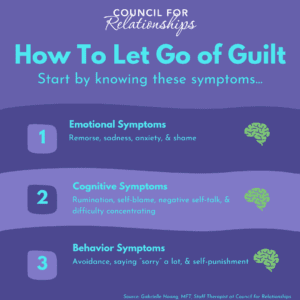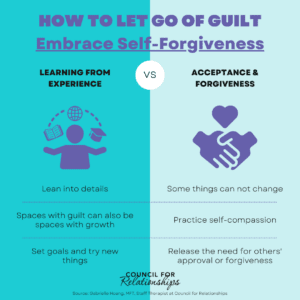How To Let Go of Guilt
People feeling guilty about various situations frequently come to my small office. This includes a teenager dealing with their parent’s divorce and a client regretting not expressing themselves in their friendships. After sharing their stories, clients ask me one or both of the following questions (both of which relate to how to let go of guilt):
- Where do I go from here?
- What do I do now?
These questions make me think about how I deal with things I can not change and my own experiences of feeling sorry. While my stories are not identical to my clients’, they share similar elements. I feel guilty for betraying trust, making bad choices, and saying hurtful things to get back at someone.
I do not have a simple solution for guilt. However, I discuss it with my clients and reflect on it in my own life. If you are experiencing similar stories or feelings, my hope is that you know these ordeals are normal. Not only that but there is also a path forward.
What is Guilt? And What Can Cause It?
All feelings give us a “red alert” signal in response to external stimuli. Guilt arises when a person feels they have violated their ethics or morals. Can you name “guilt” as what you’re feeling? And what is this feeling in response to?
Making mistakes, hurting peoples’ feelings, and inaction are some of the reasons my clients have expressed remorse. But regret can take other forms. Other things can bother you. These include not meeting your parents’ expectations, hurting others, and not achieving your own goals or expectations.
A significant part of letting go is understanding where these feelings originate and acknowledging their impact on you.
Symptoms and Effects of Guilt
Guilt can manifest in various emotional, cognitive, and behavioral symptoms. However, it may look different in different people.
Emotional symptoms
- Remorse: overwhelming feelings of regret and sorrow about one’s actions
- Sadness: feelings of unhappiness
- Anxiety: worry about potential consequences or judgment from others
- Shame: the sense of not being enough
Cognitive symptoms
- Rumination: constantly thinking about the perceived wrongdoing and replaying the events
- Self-Blame: holding oneself responsible for that action
- Negative Self-Talk: having a negative internal dialogue about one’s worth and character
- Difficulty concentrating: having trouble focusing on tasks at hand
Behavioral symptoms
- Avoidance: steering clear of things associated with the wrongdoing
- Saying “sorry” a lot: expressing remorse and seeking forgiveness
- Self-punishment: engaging in behaviors in hopes of atonement
Feeling guilty can have a significant effect on your life. It can make you feel bad about yourself and stressed, affecting your relationships and physical health. It can also influence how you approach future relationships and see yourself.
When should you seek help for guilt?
Feeling guilty is normal. If guilt is impacting your life or is becoming hard to manage, get assistance from a mental health professional. They can provide personalized strategies to support you in dealing with guilt. They may offer individual-specific tools to help you on your unique journey with guilt.
Why is guilt so hard to overcome?
Letting go of guilt can be challenging. It requires a deep sense of self-reflection and accountability. Acknowledging the role and taking responsibility can accompany a heavy emotional burden.
The weight of remorse can sometimes be too much for some to handle, leading to difficulty forgiving oneself. Some may feel they do not deserve forgiveness.
Is it always possible to overcome guilt and embrace self-forgiveness?
While I believe overcoming every type of guilt is possible, I do not live in absolutes. I am sure for many, the guilt of one’s actions or inactions can leave an impact that never truly disappears. Some people aim to navigate through the suspended feeling and keep learning from the experience.
What is self-forgiveness, and why is it so important?
Self-forgiveness is acceptance and a pardon that a person makes for themselves after a perceived mistake. Humans should release guilt and its emotional ties but still recognize the consequences of their actions. This is an example of being compassionate towards yourself.
Learning from the Experience
Instead of thinking things are completely right or wrong, try to see them in more detail. While there can be guilt, there can also be growth.
Think about what happened, admit if you are responsible and had a choice, and take away what you’ve learned. Identify any improvements you can make, set goals, and perhaps try different approaches. While you cannot change the past, you have a choice in how you respond to situations in the future.
Acceptance and Forgiveness
Practicing self-compassion can help with this difficult part. Treat yourself with the same kindness and understanding you would offer to a friend in a similar situation. Try to appreciate your efforts to rectify past wrongs and your willingness to grow from them.
Releasing the need for others’ approval or forgiveness is important when letting go of regret. I, myself, have difficulty with this part here. While asking for forgiveness or approval can be important, you can not count on it as a reliable source of self-worth. Focus on forgiving yourself, too.
Final Thoughts on How To Let Go of Guilt
As I consider my thoughts and feelings more on this subject, I know it may be tough to practice the words I’ve written. Letting go of guilt, like all difficult things, takes time to do. It takes time to name, acknowledge, accept, learn from, and move forward.
I admire the bravery of therapy clients and readers who can relate. I am proud of the personal growth in your journeys.
About the Author
Gabrielle Hoang, MFT, is a therapist in Philadelphia and Wynnewood, Pennsylvania. She accepts new clients for individual, couples, and family therapy online and in person. If you have questions about mental health conditions, mental health counselors, or Gabrielle’s practice, fill out the form on her biography page. Click here to request an appointment with a CFR Clinician, clinical psychologist, or psychiatrist.
See our Therapist & Psychiatrist Directory to find a different CFR therapist or psychiatrist near you.
More from CFR
Our expert therapists, psychologists, and psychiatrists offer so much more to explore! Check out the CFR Expert Voices blog for great mental and emotional health advice and insight. Here are a few recent blogs we think you will enjoy.



